We are reader-supported. When you buy through links on our site, we may earn an affiliate commission. Learn more
Beetroot: Feel the Beet! What Is It And What Is It Good For?
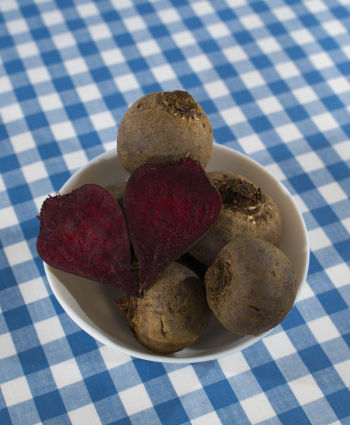
When it comes to healthy foods, it’s hard to beat beets. Beets are one of the most potent vegetables when it comes to the health benefits they can provide you.
Besides being loaded with vitamins and minerals, beets are also high in other health-promoting compounds like antioxidants, carotenoids and nitrates that help amplify the number of health benefits beets can provide for you and your loved ones even more.
In this article we will show you what a beetroot is, if it has any health benefits and if so, what they are.
We've also dived in to the research of beetroot juice and what the benefits are of drinking it.
Beets support a healthy heart, a healthy brain, healthy blood sugar levels and much more.
If you yet haven’t tried some colorful fresh beets or energy-boosting beet juice, then it’s time to start the habit of enjoying the many health benefits this beautiful vegetable can provide to you and your loved ones!
Table of Contents
Beetroot is both a vegetable and a fruit
Beetroot is classified as a vegetable but acts both as a fruit as well as a vegetable.
Fresh form of beetroots is generally consumed in salad or smoothies. But there are lot of different thing you can do with this versatile vegetable.
Other than as a food, beets play another role as a natural colorant in textile industries and as a medicinal plant to cure various illnesses.
The scientific name of Beetroot is Beta Vulgaris. Beets have been an important cultural and culinary foods for thousands of years.
These plants have long been cultivated for their red taproots and have for a long time been known for their potential medicinal uses.
All beets are part of the same family as spinach and chard. They contain countless vitamins, minerals, antioxidants and fiber. Beetroots are good sources of vitamins and minerals, such as folate, manganese, potassium, iron, and vitamin C.
Beetroots are unique in their power as an energy booster, anti-inflammatory and as a great detoxifier.
What Are Beets?
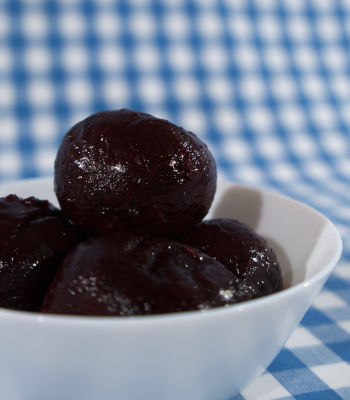
Beets come from the taproots of beetroot plants.
A taproot is a large, central, and dominant root from which other roots sprout laterally. All parts of the plant are edible, not just the taproot, as the general consumption is. For instance, young beet greens in salads are delicious.
When you think of beets it’s quite common that the first thing that pops in to your mind is the beautiful richly colored red beet.
But there are countless other varieties of beetroots like sugar beets, golden beets, and many others, each with a unique culinary profile.
Beetroot is a vegetable also known as
- Red beet
- Table beet
- Garden beet
Does Beetroot Contain Nitric Oxide?
Beets are rich in natural chemicals called nitrates.
Through a chain reaction, your body changes nitrates into nitric oxide. Nitric oxide helps with blood flow and blood pressure.
Because nitric oxide can dilate your blood vessels, it can help bring more oxygen to your muscles.
This is why beetroots are becoming increasingly popular among athletes, you can now easily find beet supplements that contain nitric oxides and other compounds derived from beets to promote endurance and physical performance.
What Is Beetroot Good For?
In our experience you almost never hear about beetroots when someone is talking about super healthy foods.
That’s too bad because beetroots are amazing.
They contain lots of health benefits which are really good for you.
Beetroots contains loads of antioxidants, have anti-inflammatory properties, can protect your brain, give you fiber for your digestion, they go easy on your blood sugar and can prevent certain cancers.
Loads of antioxidants
Antioxidants are compounds that help neutralize harmful free radicals, preventing oxidative stress and damage to your cells. Beetroot are naturally high in these disease-fighting phytonutrients, antioxidants, vitamins and minerals.
In fact, beetroots contain lots of a certain type of phytonutrients called betalains (betacyanins). Betalains have powerful antioxidant and anti-inflammatory properties ◳, which supply many of the health benefits of beets.
Anti-inflammatory properties
Inflammation is often a normal response by the immune system that helps protect the body against foreign invaders and infection.
The research in this area is extensive and the evidence shows us that chronic inflammation ◳ is at the root of many diseases and may be a major contributor to chronic conditions like heart disease, cancer and even obesity.
Beetroot have shown promising results of contenting anti-inflammatory properties. ◳
Protects the brain
Beets promote a healthy mind and your mood. The blood flow to the brain increases. This can help you feel more focused and clearer.
Researchers have discovered that the nitrate in beets improves the brain’s oxygenation which in turn can lead to slowing down age-associated dementia’s ◳ progression.
Beetroots enhances oxygenation and blood flow to parts of the brain that need nitrate and improves overall nerve tissue health.
Fiber for digestion
Beetroot are a good source of fiber, ◳ which is beneficial for your digestive health, as well as reducing the risk of a number of chronic health conditions like constipation, inflammatory bowel disease and diverticulitis.
Easy on the blood sugar
Beetroot can help regulate the blood sugar levels of your body. If you consume beetroot in raw form, it won’t spike your blood sugar level.
The natural sugars are released at a very slow rate when eating beetroot. So, even if you have diabetes you should be able to consume beetroot and drink raw beetroot juice without any worries ◳.
Prevents certain cancers
Beetroot contain pigment betacyanins that combats cancerous cell growth and prevents skin and lung cancer. Many studies have found anticancer and chemopreventive properties of beets.
They also seem to inhibit the cell mutations caused due to the production of nitrosamine compounds in the body, and prevents the cancer formation.
The combined findings suggest that beetroot ingestion can be one of many useful means to prevent cancer ◳.
What Does Beetroot Look Like?
Beetroots are round, hard, red/ dark red/ purple colored taproots of vegetable that grow underground.
Above ground grows pinkish stalks with green leaves, that are edible.
When harvesting you simply grab the beet by its stalks and pull. A taproot comes up all wet and spotted with dirt. The skin can vary in color from very red to dark brown.
To be able to eat the just harvested beet, you have to get rid of the paper-thin skin first. You can peel it off while it’s raw or if you’re planning on cooking the beets you can leave the skin on and peel it just before eating. It’s up to you. In any case your fingers will get stained in the process, beets stain everything so be a bit careful.
How to select beetroots in store
When buying beets, look for small or medium-sized beet roots that have a uniform, smooth skin and deep color.
The most common colors you find in the store are either purple, red, pink striped or golden. Steer clear of fresh beets that have spots or strong bruises where the beet juice is “bleeding” from the taproot.
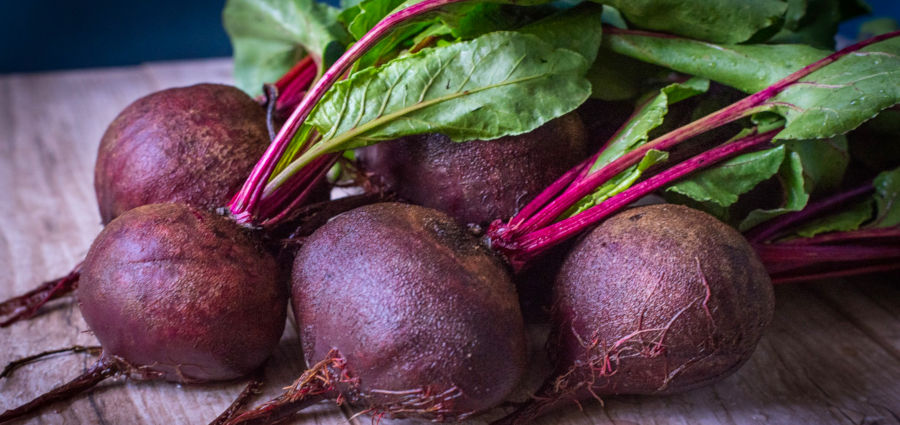
What Makes Beetroot Red?
Betacyanin, also called Betalains, is the substance that gives beets their distinctive deep red color.
It’s the most common pigment in beetroot and is a very powerful antioxidant.
Red beet products and supplements used regularly in the diet may provide protection against certain oxidative stress-related disorders, because of the Betacyanin. ◳
What Is Beetroot Used For?
The most common way to prepare a beetroot is to boil or roast it, or to eat it raw.
The raw beets usually end up either alone or combined in a salad with other vegetables.
The largest commercial production of beetroots are processed beets, boiled and sterilized or into pickles.
The green leaves that grow above ground are called beet greens. The beet greens are also edible. The young leaves can be added raw to salads, while the mature leaves are most commonly served boiled or steamed, in which case they have a taste and texture similar to spinach.
There are many different ways to prepare beetroots. You can boil or steam them, you can eat them raw - just peeled. Beetroots can be eaten cold or warm.
A delicacy is to have the beetroots steaming warm and serve them with melted butter on top.
They can be eaten cold as a condiment or just peeled, shredded raw, eaten in or as a salad. Pickled beets is a traditional food in many countries.
Beetroots is also used in making wine.
Can You Eat The Beet Greens?
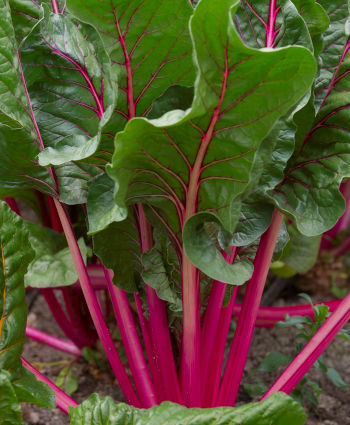
Yes! The beet greens are edible. Beet greens are the green leaves that grow above ground. They are highly nutritious.
Most throw the leaves away or buy the beets without the leaves. But if you want to be sure that the beets are fresh when you buy them you should go after the ones with the greens left. They should look green and fresh.
The leaves are actually very nutritious and healthy for you, so you shouldn’t throw them out.
They are containing important nutrients like protein, phosphorus, zinc, fiber, vitamin B6, magnesium, potassium, copper, and manganese.
Beet greens can also provide significant amounts of vitamin A, vitamin C, calcium, and iron.
Beet greens almost have the same amount of iron as spinach. Which is a lot more iron than in the taproot itself.
Potential side effects of beet greens
Beet greens has a high content of oxalate. You can find oxalate in both greens and taproot, but the leaves have them in a higher concentration.
Oxalates occurs in many plants, like beetroot and spinach, where it is synthesized by the incomplete oxidation of carbohydrates. These oxylates can lead to the formation of kidney stones ◳ in people who are prone to them.
If you’ve had kidney stones in the past, you should be very careful with eating beets and especially beet greens.
What Is Beetroot Juice?
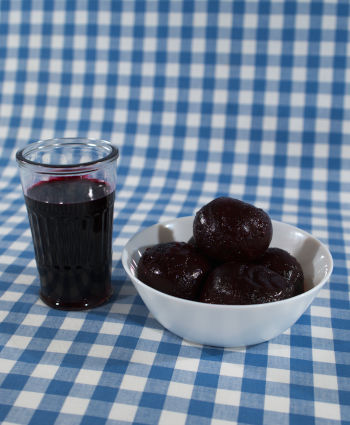
Beetroot juice have lately been named by name as a "super drink".
Much like the term super berry, a super drink, is thought to be much more beneficial for your health than other "non-super" alternatives.
Beetroot juice is said to reduce blood pressure, protect the stomach, counter act colds, increase oxygen uptake and increase performance during exercise.
Beetroot juice is derived from the beetroot, which is the taproot of the beet plant.
The juice has become one of the more popular health juices on the market.
This is thanks to its incredible wealth of nutrients, including minerals, vitamins, fiber, and antioxidants.
To get all the healthy benefits from the beetroot juice, you need to drink about 6 – 10 ounces (2-3dl) every day.
Benefits Of Beetroot Juice
Beetroot juice has a lot of health benefits.
For example, the juice has the ability to
- Boost your energy
- Counteract colds
- Promote heart health
- Lower your blood pressure
- Rejuvenate your brain(!)
- Lower your cholesterol levels
- Detoxify your body
It might even aid digestion, support vision and reduce inflammation. No wonder it’s called a “super drink”.
Boost your energy
Beets helps you to exercise longer. Lots of studies have been made on this subject. This has led to an increased use of beetroot juice among athletes as well as among ordinary people that work out.
One interesting study made by some researchers from Spain in 2017, on the effects of beetroot juice ◳ supplementation on cardiorespiratory endurance in athletes. They found that drinking beetroot juice could boost endurance levels in athletes.
The researchers suggest that to get the best result you should drink the juice within 90 minutes of your exercise session.
Counter act colds
The beetroot juice contains lots of antioxidants. The juice has high content of vitamin C and anthocyanins.
Antioxidants have the power to strengthen the immune system ◳ and thereby prevent colds among other things.
Beet juice promotes heart health
One of the biggest benefits of beet juice is its ability to promote heart health.
Beetroots are a rich source of dietary nitrates, which act as vasodilators to aid in improving blood flow ◳ and reducing blood pressure.
Reduces blood pressure
Perhaps the most famous and important use of this natural juice is for its ability to lower high blood pressure. ◳
When drinking beetroot juice, the impact it can have on hypertension is almost immediate.
This is due to the presence of nitrates, which can relieve tension in the veins and arteries, allowing the cardiovascular system to relax.
Rejuvenates the brain
It’s known that exercise has positive neuroplasticity effects on an aging brain. It’s also known that beetroot juice increases blood flow to the brain and enhances exercise performance.
So, researchers put the two together and the results were astonishing.
The reaches made on the subject showed that older adults who exercised and consumed beetroot juice, resulted in that their brain connectivity rejuvenated ◳. It closely resembled what you see in younger adults.
Lowers cholesterol
The unique antioxidants betaine found in beet juice, has been linked to lower cholesterol levels.
An animal study found that beetroot extract lowered total cholesterol and triglycerides and increased HDL (good) cholesterol ◳. It also reduced oxidative stress on the liver.
Detoxifies
Your body has its own detox system that helps keep you healthy by continually clearing out toxins. Kidneys, lungs and skin work to clear out toxins from your body.
Your liver also plays a crucial role in detoxification by removing toxins and other harmful substances from the blood.
By drinking beetroot juice, you might actually help your liver. The juice can help to keep the liver working efficiently so it can continue to keep your body free of toxins.
There have been several animal studies that has showed that at beetroot juice helped ◳ increase the levels of specific enzymes involved in detoxification.
Potential Side Effects Of Beetroot Juice
Despite all of the impressive health benefits this juice contains it also has some side effects that you should be aware of. The side effects of drinking beetroot juice can give you stomach issues and excess mineral storage.
Pregnant women are advised to use caution, the research is lacking in this area. So, it’s better to be safe than sorry.
If you’re suffering from kidney disease you should stay away from beetroot juice.
Beetroot juice can cause stomach issues
The powerful active ingredient nitrate in beetroot juice can cause irritation in the stomach. ◳ This can in worst cases lead to vomiting, nausea, stomach upset, and general inflammation of the gut.
If you are already suffering from gastrointestinal issues, beetroot juice can aggravate the issue. It can also cause bloating, flatulence, and cramping.
Do not overconsume beetroot juice
Beetroot juice is high in certain minerals, which is definitely a good thing, provided your body can process them properly.
Extreme consumption of beet juice might cause an accumulation of metals, ◳ such as iron, copper, magnesium and phosphorus, in the liver, which can result in various unwanted side effects.
Be careful with beetroot juice if you have kidney issues
Drinking high levels of pure beetroot juice can significantly raise your levels of oxalic acid ◳ in the body, which contributes to the development of kidney stones.
If you have a history of kidney stones, you might contract the condition again upon beetroot juice consumption.
One of the most effective and certainly obious ways to prevent recurrence of kidney stones, ◳ is to keep away from foods that can build them. So don’t overdo the beetroot juice.
Consumption of beetroot juice during pregnancy
There is some debate about the consumption of beetroot juice during pregnancy. Some of the nutrients and minerals can be beneficial for a pregnant woman but there are no adequate studies to support its safety during pregnancy.
I recommend speaking to your physician if you want to drink beetroot juice during pregnancy.
If you take prescribed medication
If you have never had beetroot juice before and you are taking prescribed medication, I recommend you check with your doctor before, to make sure the juice will not interfere in any way with your medication.
Beetroot juice is potent and you should consume it in moderation

Beetroot juice is one of those foods that are so strong that you should consume it in moderation. The saying, You are what you eat
, is true on so many levels but with many healthy foods you might not even notice the benefits it provides. This is mostly because many of the effects come gradually.
Beetroot juice is not one of those foods. The effects of this juice is very rapid when compared to other foods.
We recommend you to buy this all natural organic beetroot juice #ad available on Amazon if you want to take advantage of all the potential health benefits that beetroot juice can provide to you and your loved ones!
Calories In Beetroot
Beetroot has 45 calories / 100 gram.
Beetroot has high sucrose content and a high content of fiber that makes the root amazing and very popular among people that are on a weight-loss diet.
The calories are plant-based which is the healthiest form of sugar. The high fiber content in beetroot helps you feel fuller longer and helps you cope with hunger pangs.
What is Beeturia?
Beetroots have one unique property that could cause worry, but is perfectly safe. The pigments that give red beetroots that unusual color will give your urine and stool a red or pink color. This is called Beeturia. ◳
This doesn’t happen to everyone, but if this happens to you, don’t be alarmed. While some people mistake this red coloring for blood in their stool, it’s not.
This temporary change in coloring is harmless and should go away completely after one or two bowel movements. If it doesn’t you should consult with your health professional, not because of the beeturia, but because of the possibility of something more serious.
Conclusion: Beetroot, Used In Moderation, Is Fantastic!
Beetroots are amazing. Both nutritious and tasty. Beetroot do have an acquired taste, it’s not appreciated by everyone.
But there are ways to prepare beetroots, you don’t always have to eat them raw.
Beetroots contain loads of antioxidants, have anti-inflammatory properties, can protect your brain, give you lots of healthy fiber, they go easy on your blood sugar and can prevent certain cancers.
Beetroot Juice does wonders
You can also drink the beetroot juice which is incredibly nutritious! The juice has the ability to increase energy, counter act colds, promote health heart, lower blood pressure, rejuvenate the brain, lower cholesterol and detoxify the body
Both the root and the juice have lots of health benefits, but the beets must be to eat the beetroot, then you get the saturation as well.
Potential side-effects of beetroot
There are also side effects to beetroots that you need to be aware of. If you, for instance, have kidney problems or if you are pregnant I recommend you stay away from both the beetroot and the beetroot juice.
Choose to change to a healthier diet in small steps
If you want to make changes and start eating more healthy and nutritious foods, choose the foods you start with carefully. Then continue to add foods to your diet that you find easy to prepare and delicious, in small steps. Don’t overdo it, that usually won’t last.
One thing that is important to remember, is that there are no easy cures! There is no single food that you can eat that will fix it all. You have to vary what you eat.
It’s the combination of everything you eat that is you! Your body and your health is maintained by the things you eat.
So why not help your future self by choosing the best foods to eat?
We have a whole section about healthy foods for you to be inspired by when you're ready to take that first step.
What is beetroot good for?
Beetroot is amazing. Beetroot is among the most potent of vegetables when it comes to the health benefits it can provide. It contains a wealth of antioxidants, has anti-inflammatory properties, can protect your brain, gives you fiber for your digestion, goes easy on your blood sugar and can even prevent certain cancers.
What does beetroot look like?
Beetroot grows in the ground. They are round, hard and has a color spectrum from red to dark red to purple. Above ground grows pinkish stalks with green leaves.
Can I drink beetroot juice everyday?
Yes, you can. It's great to drink before you exercise. But like with many things, do it in moderation. It takes only between 6-10 ounces or 2-3 dl to get all the health benefits from the beetroot juice when you consumer it daily.
Can you eat beetroot raw?
Yes, you can eat beetroot raw. It's actually really healthy for you. But still the most common way to eat beetroot is cooked or otherwise processed. What more is that you also can eat the beet greens. That is the leaves of the beetroot, that are very nutritious.



 TM
TM